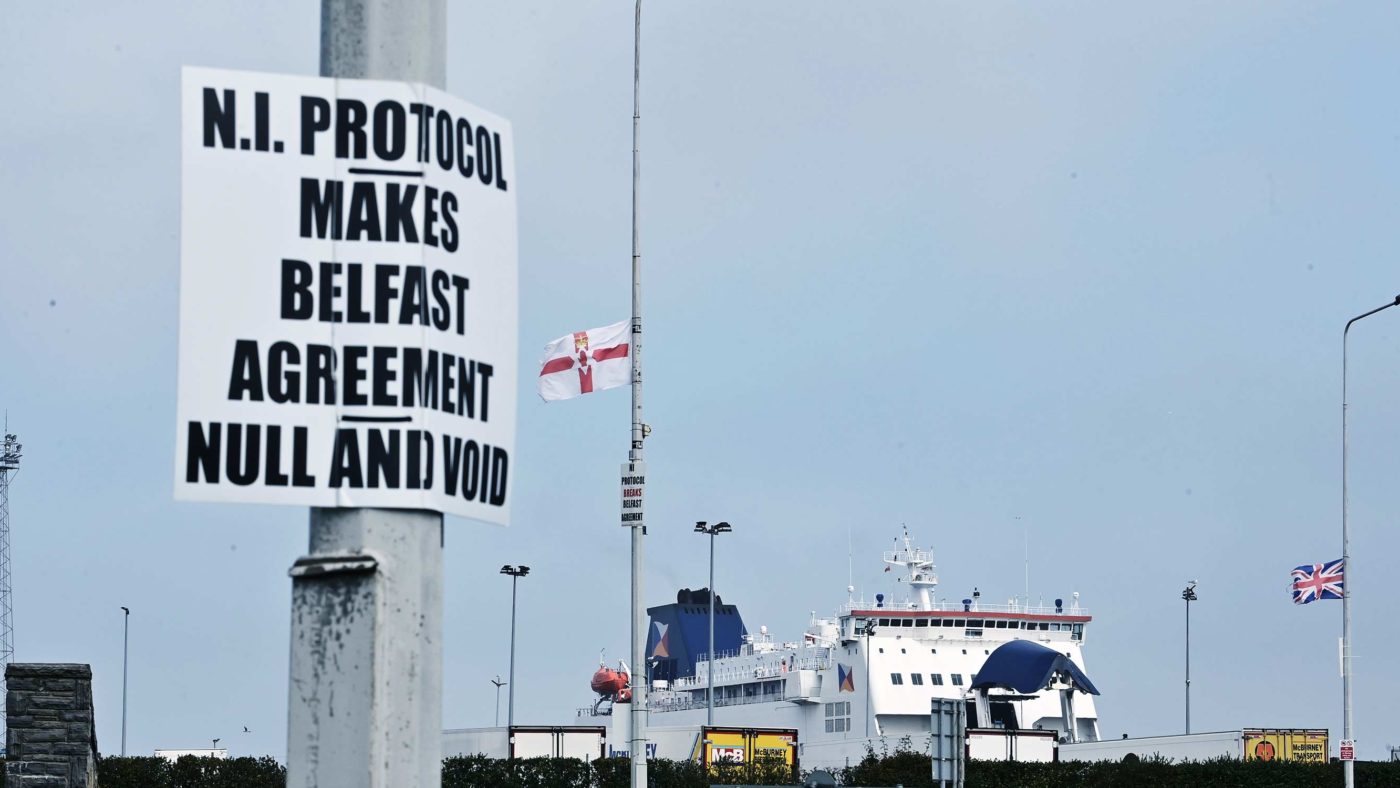The government reportedly has a new plan to deal with the Northern Ireland Protocol.
The Prime Minister and his advisers have spent the best part of a year and a half wrestling unsuccessfully with the consequences of the Irish Sea border they agreed with the EU. In many areas, the law in Ulster is determined by Brussels rather than Westminster and Northern Ireland’s Agriculture department claims that 20% of the documentary checks at Europe’s borders take place at Northern Irish ports.
The Financial Times reported last week that, in response, Boris Johnson has prepared legislation ‘that will give ministers sweeping powers to rip up the post-Brexit trade deal‘ in the province.
Over the weekend, Johnson confirmed his intention to ‘fix’ issues with the Irish Sea border and the Northern Ireland minister, Conor Burns, reiterated the Government’s intention to take ‘remedial action’, adding that he hopes “Brussels is listening to this conversation and other conversations”.
In typical fashion, pro-EU pundits reacted as if the PM had threatened to invade France. We do not yet have any detail about what is planned, but Stephen Farry, the fanatical europhile MP for North Down, blethered excitably about Boris ‘breaking international law’.
Despite this Pavlovian response, Ulster unionists will be cautious about putting too much store in the Government’s plans. The legislation is supposed to give ministers powers to ‘switch off key parts of the protocol in UK law, including border checks on goods’. But Johnson and others have already threatened repeatedly to trigger Article 16 of the Protocol, which would give them the right to suspend elements of the sea border. They say that the conditions for using this sanction have been met, but they’ve crashed through multiple supposed ‘deadlines’ in their talks with the EU without doing anything.
The FT’s report is based on an anonymous briefing from ‘Whitehall insiders’, so it certainly doesn’t amount to a commitment from the Government. It’s also not clear what the bill would consist of.
If ministers were given powers to suspend elements of the Protocol, for example, would they use them immediately? Perhaps the Government merely intends to put more pressure on the EU to negotiate pragmatically.
The Protocol raises practical issues, pushing up prices and creating barriers for goods moving between Great Britain and Northern Ireland. But, more importantly, it creates fundamental constitutional problems. For unionists, being separated legally from the UK is more important than the unavailability and cost of certain types of products.
Would the bill make only short-term, practical changes, or would it tackle deep-seated constitutional issues? The Protocol’s impact is already mitigated by temporary ‘grace periods’ that delay some of its more drastic effects. Another set of short-term solutions will not remove the sea border.
Northern Ireland is currently embroiled in a bad-tempered election campaign. In February, the DUP’s Paul Givan resigned from the first minister’s post, collapsing the power-sharing executive in protest at the Protocol. His party will be asked to nominate a first or deputy first minister, if it is still the biggest unionist party after the election on the 5th of May. The DUP’s leader, Jeffrey Donaldson, is not a natural hardliner and he desperately wants a pretext to go back into government.
Although he is already an MP, Donaldson is standing for election to the Stormont Assembly in the Lagan Valley constituency.
The Government might think that a Northern Ireland Bill is the best way to avoid another political impasse at Stormont. If the legislation does not address the problems with the Protocol effectively, though, it will merely delay any crisis.
To work properly, the bill must restore the province to the UK internal market unequivocally. If a product can move as seamlessly from Liverpool to Londonderry as it does from London to Llandudno, then the Government will have done its job.
More than that, though, British law, rather than EU rules, must apply in Northern Ireland.
A group of unionists including Ben Habib, Kate Hoey and Jim Allister are currently embroiled in a court case challenging the Protocol. At the most recent hearing, judges in the Appeal Court found that the sea border ‘subjugated’ the Act of Union, which created the United Kingdom of Great Britain and Ireland.
The litigants argue that this proves Ulster’s role in the UK was undermined without any democratic input from voters here. Northern Ireland may remain formally part of the Union, they say, but the substance of its membership can be eroded until it means next to nothing. By this analysis, the province’s place in the UK is symbolic rather than substantive.
It would be great to believe that the Government really will do something meaningful about the Protocol and repair the Union, after so many baseless promises. However, if the legislation is designed primarily to put more pressure on the EU, to get the DUP back in government or to delay the sea border’s worst effects, then it is unlikely to be effective.
Click here to subscribe to our daily briefing – the best pieces from CapX and across the web.
CapX depends on the generosity of its readers. If you value what we do, please consider making a donation.


